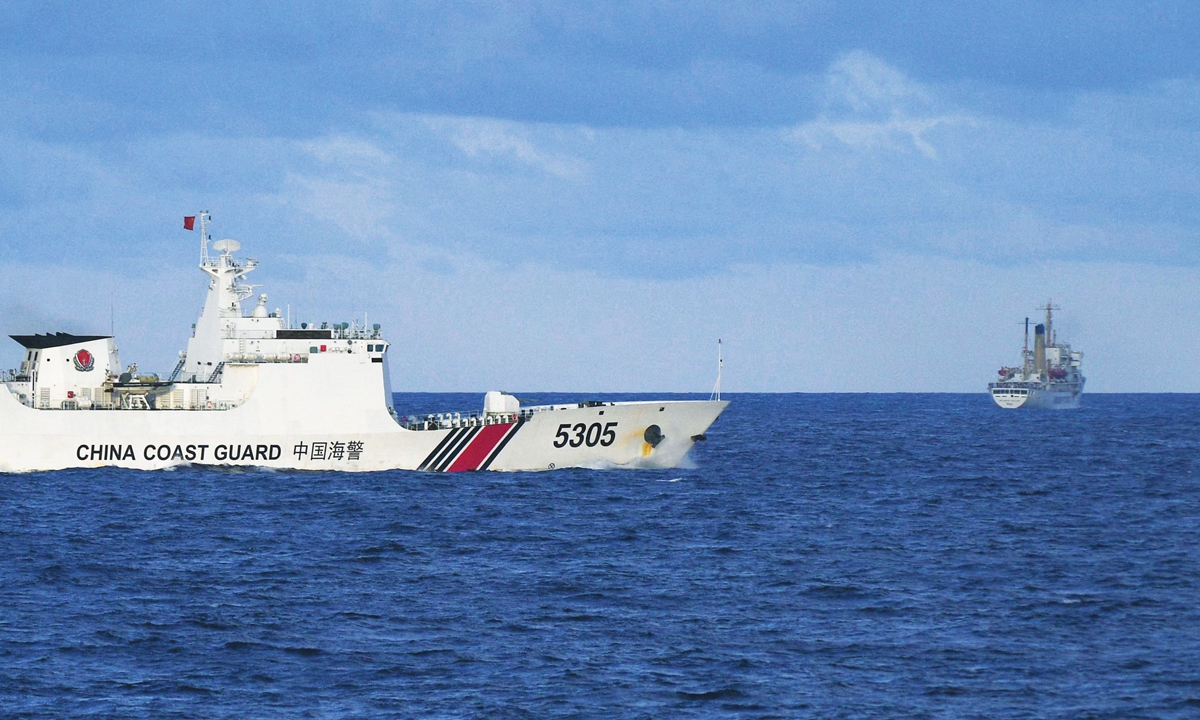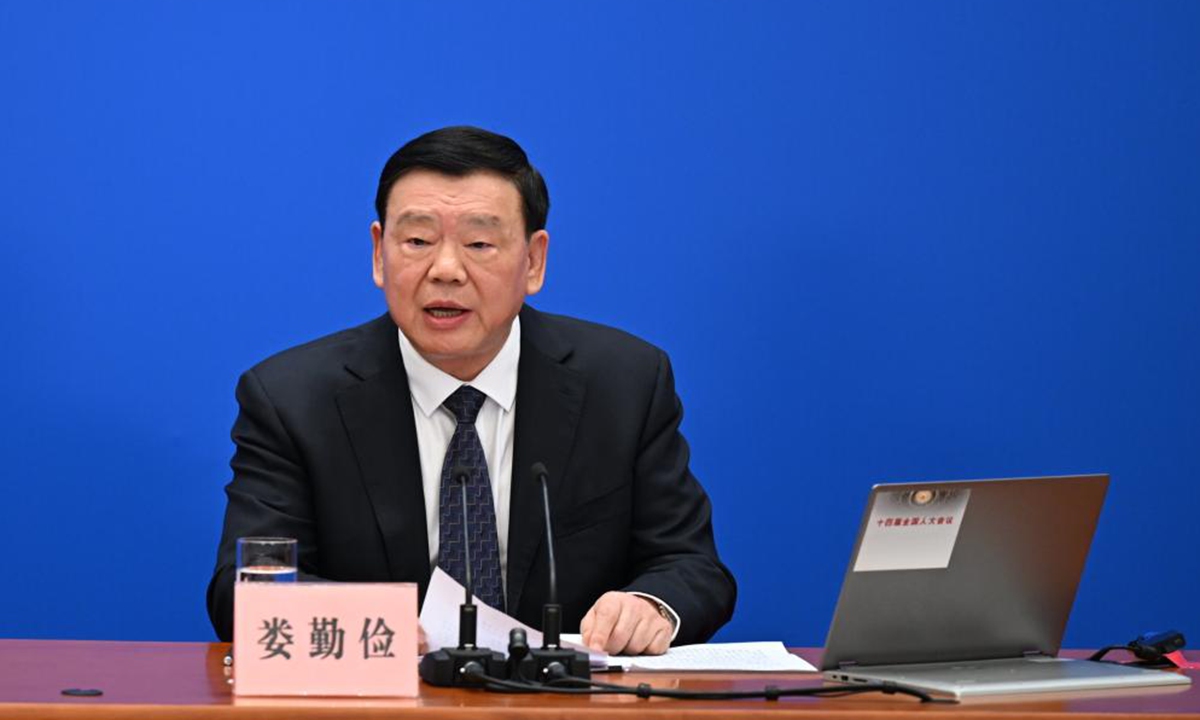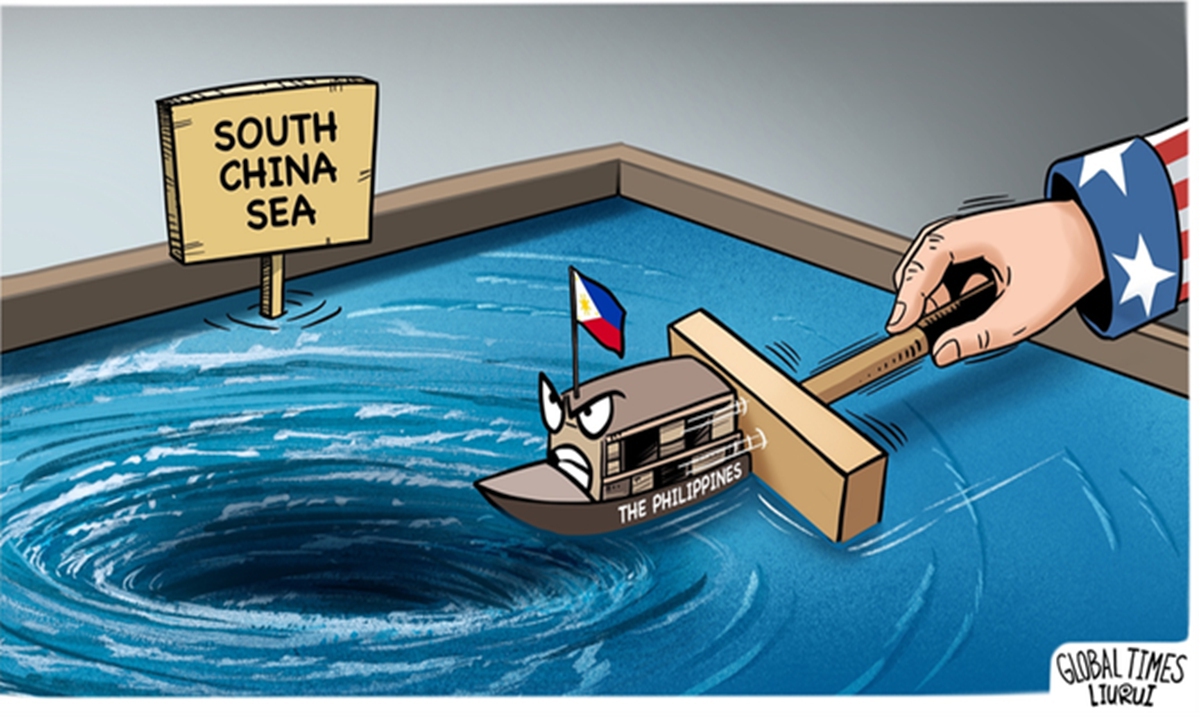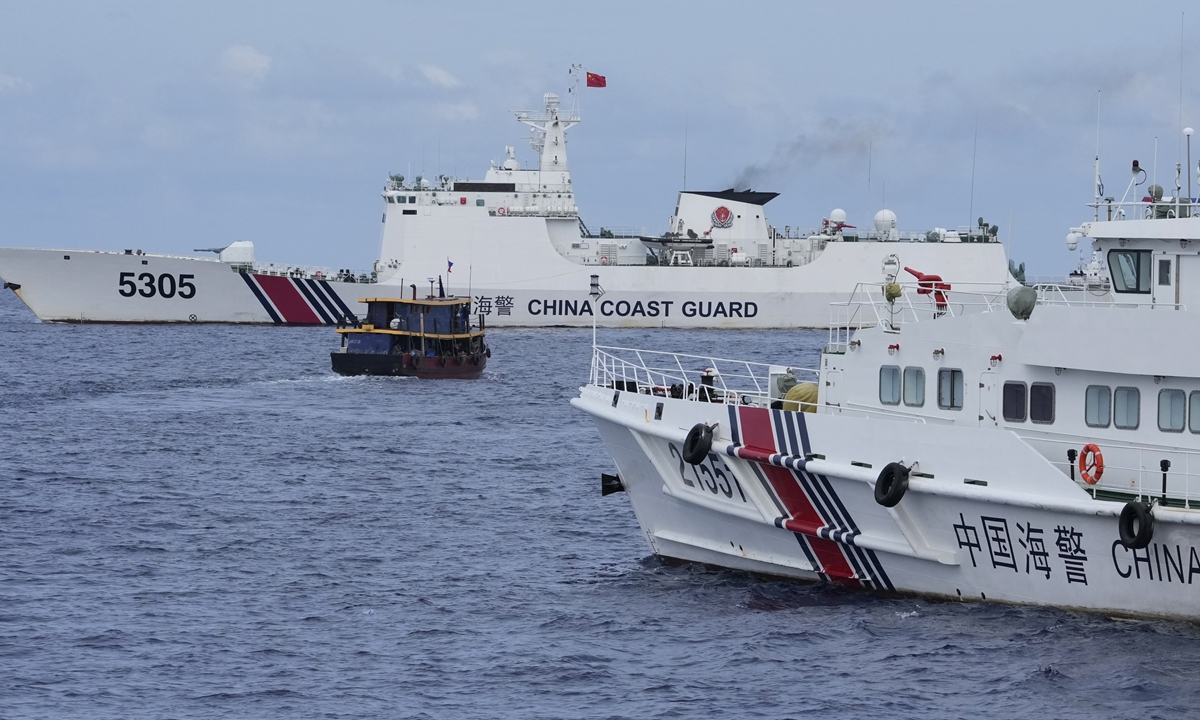
A Chinese Coast Guard ship drives away a Philippine vessel that intrudes into adjacent waters of Ren'ai Jiao in the South China Sea on December 10, 2023. Photo: VCG
Editor's Note:
The escalation of recent China-Philippine tensions raises concerns among neighboring countries in the South China Sea. How will the Philippines' provocations, instigated and supported by the US, affect the situation in the South China Sea in 2024? How do other ASEAN countries perceive the Philippines' South China Sea provocations? Why do they hope that the situation will be contained?
In the "ASEAN Perspective on the South China Sea" series, we collect wisdom and insights from former diplomats and scholars from ASEAN countries. Peter Chang (Chang), a research associate of the Institute of China Studies at the University of Malaya, told Global Times (GT) reporter Wang Zixuan that the territorial disputes in the South China Sea are complex, yet they can and should be resolved through diplomatic means.
This is the first piece of the series.
GT: The South China Sea issue has witnessed increasing collusion and provocation between the US and the Philippines. For instance, the two countries conducted the third joint patrol in the South China Sea earlier in February. With these actions continuing, how might the situation in the South China Sea evolve in 2024?
Chang: The increasing display of naval power in the South China Sea poses a significant threat to the ongoing efforts aiming to preserve peace and stability in the region. The third set of joint patrols conducted by the US and the Philippines exemplifies the surge in military activities. Should this trend persist, 2024 is likely to present formidable challenges in maintaining order and resolving the dispute in the South China Sea.
GT: How have extra-regional countries, especially the US, influenced the situation in the South China Sea? Will Washington really help Manila if a conflict breaks out between China and the Philippines?
Chang: Certain extra-regional powers have inserted themselves into the South China Sea dispute, ostensibly in the name of upholding the freedom of navigation. These interventions have undeniably added complexity to the continuing efforts to resolve peacefully the challenges in the South China Sea.
The Biden administration has reaffirmed its commitment to defending the Philippines. The Marcos administration appears convinced that the Americans will come to their assistance in the event of a conflict. However, given the ongoing Gaza crisis and the fluctuating US support for the war in Ukraine, where American attention and resources are stretched thin, it remains uncertain whether the US has the political will to engage in yet another distant conflict on the opposite side of the globe.
GT: You once mentioned in the interview that "we've got to resolve it [the South China Sea issue] diplomatically, that is the only way." However, some scholars think that the Philippines is adopting "microphone diplomacy" on the South China Sea issue. What's your take on this? How should we work together to ensure the situation is under control through diplomacy?
Chang: The territorial disputes in the South China Sea are complex, yet they can and should be resolved through diplomatic means. Opting for an alternative course of action would prove disastrous for all parties involved.
Sure, competing for and claiming territory is a source of divisions, but there are also shared goals that bind us together, such as our mutual desire for social-economic growth. It is crucial we set aside our differences and concentrate on nurturing these common aspirations, fostering economic development for the greater good of our peoples.
GT: Why do you say that Malaysia hopes that "the situation will be contained"? How have the current tensions negatively impacted other countries in the region, such as Malaysia?
Chang: The Beijing-Manila standoff has not impacted Kuala Lumpur's relationship with China or the Philippines. Nevertheless, should the tensions between China and the Philippines escalate into a military confrontation, the potential consequences would be devastating.
As evidenced by the crisis in Europe and the Middle East, open warfare exerts far-reaching repercussions beyond the battlefield. The wars in Ukraine and Gaza have undermined global geopolitical stability, disrupted international trade and economic growth, and posed the risk of escalating into a broader regional war.
Without question, open hostilities between China and the Philippines in the South China Sea will have a similarly disastrous impact on countries in Southeast Asia, and beyond.
GT: Malaysia is an ASEAN member. Some have said that the Philippines' current stance on the South China Sea issue goes against the principles and interests of ASEAN. What's your view?
Chang: The Association of Southeast Asian Nations is guided by the principle of ASEAN centrality, which asserts that ASEAN should play a leading role in addressing issues pertaining to the Southeast Asian region.
The present strife between China and the Philippines, exacerbated by US instigation, poses the risk of entangling ASEAN in a proxy war between the US and China. If unchecked, this conflict threatens to undermine ASEAN centrality and relegate ASEAN to a mere pawn on someone else's geopolitical chessboard.
The ongoing confrontation also jeopardizes another core principle - ASEAN neutrality, wherein countries in Southeast Asia aim to maintain open ties with all nations, including both China and the US. The current standoff, with US support for the Philippines against China, has the potential to compel certain ASEAN member states to take sides, to the detriment of the broader well-being of the region.
GT: What lessons should the countries in the South China Sea learn from the wars in the Middle East and Europe?
Chang: The most important lesson to learn is that we should avoid war at all costs. What's happening with the proxy war in Ukraine, as well as the conflicts in Gaza and in the Red Sea, are devastating. If there's anything we in Asia should be mindful of, it is that these conflicts ought to be resolved peacefully and diplomatically. There must be a way in which we can compromise.
We should avoid military confrontation at all costs, because it will be a lose-lose situation for everyone if there is an open conflict. If I get the chance, I will tell my Filipino friends that it will be terrible for us to get into the situation that we see right now in Ukraine and the Middle East.



